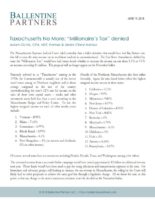 The Massachusetts Supreme Judicial Court ruled yesterday that a ballot initiative that would have had Bay Staters vote this fall to raise the state income on its wealthiest residents is unconstitutional. The Fair Share Amendment, dubbed by some the “Millionaires Tax,” would have had voters decide whether to increase the income tax rate from 5.1% to 9.1% on incomes exceeding $1 million. The proposal will no longer appear on the November ballot.
The Massachusetts Supreme Judicial Court ruled yesterday that a ballot initiative that would have had Bay Staters vote this fall to raise the state income on its wealthiest residents is unconstitutional. The Fair Share Amendment, dubbed by some the “Millionaires Tax,” would have had voters decide whether to increase the income tax rate from 5.1% to 9.1% on incomes exceeding $1 million. The proposal will no longer appear on the November ballot.
Famously referred to as “Taxachusetts” starting in the 1970s, the Commonwealth is actually one of the lowest taxed states among its Northeast neighbors and is about average compared to the rest of the country (notwithstanding the state’s 12% rate for income on the sales of short term capital assets – stocks and other investment assets held less than a year) according to the Massachusetts Budget and Policy Center. To wit, the highest marginal income tax rates of other nearby states include:
- Vermont – 8.95%
- Maine – 7.15%
- Connecticut – 6.99%
- Rhode Island – 5.99%
- Massachusetts – 5.1%
- New Hampshire – 5% (on interest and dividends, 0% on other income)
Outside of the Northeast, Massachusetts also fares rather favorably. Again, the rates listed below reflect the highest marginal income tax rate in these states:
- California – 13.3%
- Oregon – 9.9%
- Minnesota – 9.85%
- New Jersey – 8.97%
- District of Columbia – 8.95%
- New York – 8.82%
- Kentucky – 6%
- Maryland – 5.75%
- Massachusetts – 5.1%
- Oklahoma – 5%
- Utah – 5%
- Arizona – 4.54%
- Pennsylvania – 3.07%
Of course, several states have no income tax including Florida, Nevada, Texas, and Washington, among a few others.
The increased revenue from a successful ballot campaign would have raised approximately $2 billion in additional revenue next year. Those funds would have been used to pay for rising education and transportation expenses in the state. For lawmakers and advocacy groups still looking to increase the tax revenue in Massachusetts, the ruling by the Court will likely lead to other proposals to achieve the same goal but through a legislative change. All we know for sure, at this point, is that any change to the state’s current tax structure won’t be decided on the November ballot.
Learn more about Adam Ochlis, CPA, MST, Partner & Senior Client Advisor.
This report is the confidential work product of Ballentine Partners. Unauthorized distribution of this material is strictly prohibited.
The information in this report is deemed to be reliable but has not been independently verified. Some of the conclusions in this report are intended to be generalizations. The specific circumstances of an individual’s situation may require advice that is different from that reflected in this report. Furthermore, the advice reflected in this report is based on our opinion, and our opinion may change as new information becomes available.
Nothing in this presentation should be construed as an offer to sell or a solicitation of an offer to buy any securities. You should read the prospectus or offering memo before making any investment. You are solely responsible for any decision to invest in a private offering.
The investment recommendations contained in this document may not prove to be profitable, and the actual performance of any investment may not be as favorable as the expectations that are expressed in this document. There is no guarantee that the past performance of any investment will continue in the future.





